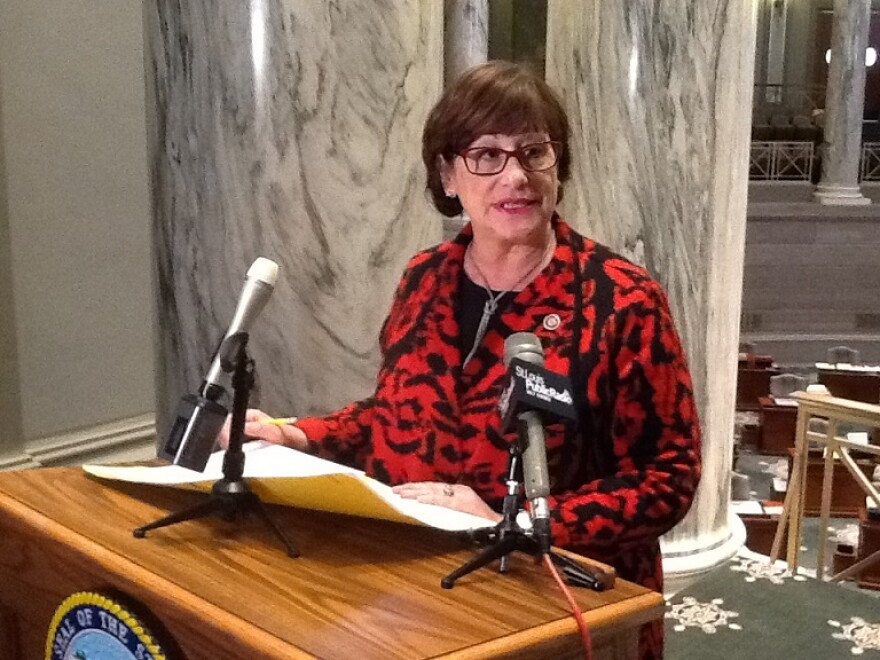Missouri lawmakers wrapped up the first half of the 2017 legislative session having achieved the session's top priority: making Missouri a right-to-work state.
Gov. Eric Greitens, a Republican, signed Senate Bill 19 into law last month. It bars labor unions and employers from requiring workers to pay dues and fees as a condition for employment.
Legislators also sent House Bill 153 to the governor, which he's expected to sign. It defines more strictly who qualifies as an expert witness, part of an overall strategy to reduce lawsuits in Missouri. That strategy includes Senate Bill 43, which would create a stricter definition of what constitutes workplace discrimination. It's been passed by the Senate and awaits action in the House.
Ron Richard, R-Joplin, is president pro-tem of the Senate.
"I meet with the governor at least once a week," he told reporters Thursday. "I mean, anytime you have your own party in charge, it always makes it nicer to be able to at least get a conversation going about where we're headed. So I'm pleased."
House Speaker Todd Richardson, R-Poplar Bluff, strongly agreed.
"The difference in being able to have a partner in the governor's office that's willing to work with us on conservative priorities makes the job of getting bills across the finish line a lot easier."
Democrats, on the other hand, say it's been a great session for mega donors who "spent millions of dollars to elect Republican lawmakers to do their bidding."
"Unless you have a fat wallet and a willingness to open it, you have no say in the Missouri Capitol," said Democratic Floor Leader Gail McCann Beatty of Kansas City.

McCann Beatty told reporters Thursday that Republican leaders should be more concerned about transportation funding and fixing Missouri's driver's licenses so they'll comply with the 2005 federal Real ID law. The state has until next January to provide compliant driver's licenses, or else they will no longer qualify as sufficient identification at airports. She and fellow Democrat, Sen. Jill Schupp of Creve Coeur, also condemned the continued push to expand charter schools and weaken labor unions.
"If you're an average everyday Missourian, you're seeing a lot of harm come out of these bills," Schupp said. "If you're a special interest, if you're a corrupt business, if you're powerful or well connected, there has been plenty of good stuff that's been happening for you."
Second half highlights
The biggest priority of the second half is the state budget, the only measure legislators are required by law to pass. Normally by this time the 13 bills that make up the budget would have already been passed by the House or at least awaiting debate in the House when everyone returns. But Greitens waited until February to unveil his spending plan for next year instead of using the January State of the State Address as past governors have done.
The House budget committee is scheduled to amend and pass the budget bills its first week back, with the full House due to get them the first week of April. State law requires that the annual budget be sent to the governor one week before the regular session ends.
Republican budget writers are already touting that their proposed budget for K-12 public schools will be fully funded, based on last year's law that shrank the size of the funding formula by $400 million.
"Cooking the books to create the illusion of full funding doesn't improve public education," said Rep. Kip Kendrick, D-Columbia. "Redirecting scarce resources to unproven charter schools doesn't improve public education."
But House budget chair Scott Fitzpatrick, R-Shell Knob, says next year's budget proposal will provide an extra $48 million to K-12 schools.
"We are in the midst of the toughest budget cycle in a generation," he said. "The budget I've proposed is the first step in identifying the priorities of the House of Representatives."
Other works in progress include:
- House Bill 60 bans gifts to elected officials from lobbyists
- House Bill 251 requires labor unions to get annual permission from employees before deducting dues from their paychecks, and requires permission to use those dues for political purposes (currently being filibustered by Senate Democrats)
- Senate Bill 182 does away with project labor agreements in Missouri
- House Bill 634 allows charter schools to expand beyond St. Louis and Kansas City and operate in class 1 counties and charter counties in Missouri
- House Bill 104 eliminates Missouri’s prevailing wage law for public works projects
Lawmakers return to Jefferson City March 27. The 2017 session ends May 12.
Follow Marshall Griffin on Twitter: @MarshallGReport





